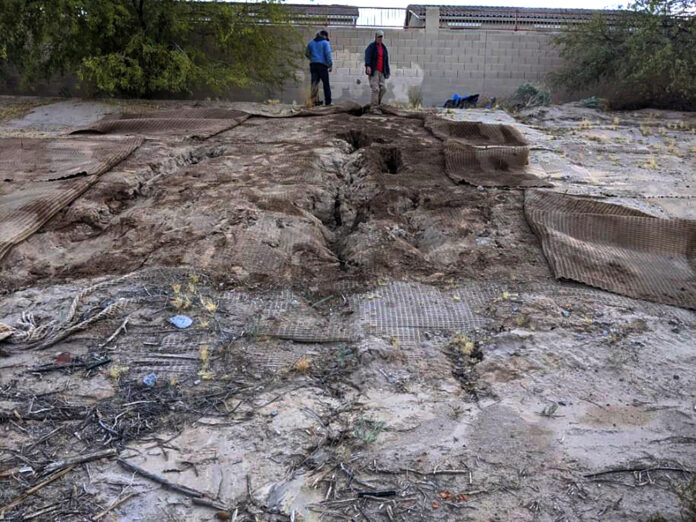
The city council acted Tuesday night to stem the tide of residents backwashing their pools into a wash.
It enacted an ordinance cracking down residents who drain or empty their pools into the Santa Rosa or Santa Cruz washes. And instituted a fine large enough to show it is serious about curbing the problem – from $250 to $2,500 for a first violation, increasing to a minimum $500 fine for a second violation. All subsequent violations carry a minimum penalty of $1,000.
The Maricopa Flood Control District has made costly repairs to the banks of the washes to fix damage caused by pool owners.
According to David Alley, district manager of the Maricopa Flood Control District, his agency has spent more than $90,000 to repair a half dozen spots where banks were washed away by backwashers. The material on the banks, which has to be brought in from south of Maricopa-Casa Grande Highway for its compaction characteristics, is extremely susceptible to erosion.
It costs an average of $15,000 per repair, which involves bringing in heavy equipment, he said.
“I know that might sound high to people who don’t do this, but that’s actually not that bad,” Alley said. “But we still spent nearly $100,000 on repairs that were completely preventable.”
Most people are likely unaware of the damage caused by backwashing, and the expense to repair the banks, he added.
“They feel like they’ve got a 300-foot channel in their backyard built to carry water away from their property, so why not? Well, the problem is the material on the banks is highly subject to erosion and any water introduced at even a low velocity will cause a trench, which will only deepen over time.”
The ordinance, Section 8.10.040, states that, “swimming pools should be drained on the property to irrigate the landscape on the property whenever possible. If it is not possible to contain all the water from the swimming pool on the property, the water from the swimming pool should be drained into the sanitary sewer cleanout on the property after obtaining approval from the sewer provider.”
Mayor Christian Price said he realizes the penalties are harsh but said there is a good reason.
“We had to make the fines pretty punitive because it is so expensive to repair this kind of damage,” Price said. “People need to use that sewer cleanout in their front yard and keep that water off the banks of the washes.”
The council discussed several ways to inform the public about the new ordinance including posting information on the city’s web site, erecting signs in and around the washes and inserting a flyer or bill in residents’ monthly Global Water bills.




![Elena Trails releases home renderings An image of one of 56 elevation renderings submitted to Maricopa's planning department for the Elena Trails subdivison. The developer plans to construct 14 different floor plans, with four elevation styles per plan. [City of Maricopa]](https://www.inmaricopa.com/wp-content/uploads/2024/04/city-041724-elena-trails-rendering-218x150.jpg)

![Affordable apartments planned near ‘Restaurant Row’ A blue square highlights the area of the proposed affordable housing development and "Restaurant Row" sitting south of city hall and the Maricopa Police Department. Preliminary architectural drawings were not yet available. [City of Maricopa]](https://www.inmaricopa.com/wp-content/uploads/2024/04/041724-affordable-housing-project-restaurant-row-218x150.jpg)










![Elena Trails releases home renderings An image of one of 56 elevation renderings submitted to Maricopa's planning department for the Elena Trails subdivison. The developer plans to construct 14 different floor plans, with four elevation styles per plan. [City of Maricopa]](https://www.inmaricopa.com/wp-content/uploads/2024/04/city-041724-elena-trails-rendering-100x70.jpg)
I believe it would also be helpful to notify the actual property owners who have pools next to these washes. Not everybody reads InMaricopa (I don’t know why either, it’s crazy) so they could be aware of the damage caused and know not to do that. If I were a pool owner I would appreciate that. Just a thought from guy.